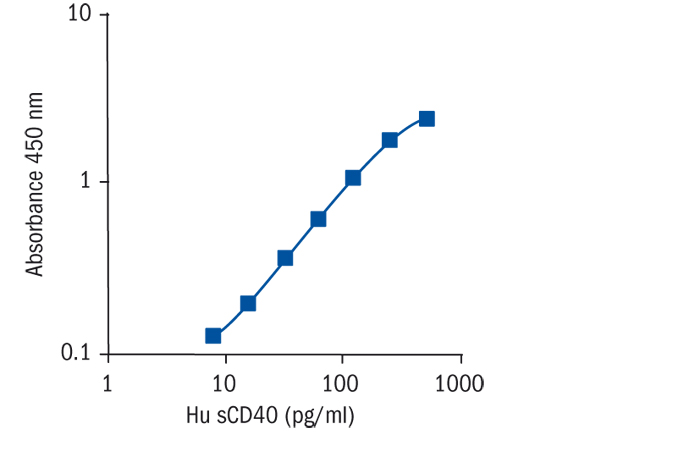Type
Sandwich ELISA, Biotin-labelled antibody
Applications
Plasma-EDTA, Plasma-Heparin, Amniotic fluid, Plasma, Cell culture supernatant
Sample Requirements
50 µl/well
Shipping
At ambient temperature. Upon receipt, store the product at the temperature recommended below.
Storage/Expiration
Store the complete kit at 2–8°C. Under these conditions, the kit is stable until the expiration date (see label on the box).
Calibration Curve
Calibration Range
7.8–500 pg/ml
Limit of Detection
6.9 pg/ml
Intra-assay (Within-Run)
CV = 5.5%
Inter-assay (Run-to-Run)
CV = 7.0%
Spiking Recovery
940%
Dilution Linearity
94,00%
Research topic
Apoptosis, Cell surface proteins (sCD), Oncology
Summary
CD40 is a 50 kDa membrane-bound type I glycoprotein expressed by numerous cells, most notably B lymphocytes and monocytes and antigen presenting cells (APC) such as macrophages, dendritic cells and fibroblasts. It is furthermore highly expressed on various malignant cells. The expression of CD40 regulates T-cell - APC interaction and has been shown to be centrally involved in a wide array of inflammatory events. The function of CD40 is very broad.
CD40 belongs to the TNF-receptor family. The ligand for CD40 (CD154) is a 33 kDa type II transmembrane protein mainly expressed by activated T-cells, and is a member of the TNF superfamily. CD40/CD40L interactions are essential for T-cell-dependent B cell proliferation and differentiation, for activation of antigen presenting cells and for cytokine production on numerous other cells.
It is presently accepted that CD40 plays a critical role in the regulation of immune responses. CD40 expression has also been found on non lymphoid cells such as fibroblasts, endothelia, and epithelial cells.
Its critical role in T-cell-dependent humoral immune responses was demonstrated by patients with the hyper-IgM-Syndrome. CD40 is also involved in the apoptotic pathway of cells. While it has been shown that the programmed cell death can be inhibited by the survival signals mediated from the binding of the CD40 receptor to the CD40 Ligand, very recently a novel proapoptotic mechanism induced by CD40 in carcinoma cells has been described. This mechanism is dependent on the endogenous production of cytotoxic cytokines.
The interaction of CD40 and its ligand, CD154 (CD40L) was found to play a crucial role in many aspects of immune response and the development and progress of various diseases. It was found to be centrally involved in transplant rejection. The interaction of CD40 on synovial fibroblasts and CD40L expressed on activated T lymphocytes is directly involved in the neovascularization in rheumatoid synovitis. CD40 expression in thyroid tissue suggests a new pathway of pathogenesis of thyroid diseases. Functional expression of CD40 on Human
melanoma cells mediates T-cell-co-stimulation and tumor cell growth.
The interaction of CD40 and CD154 is centrally involved in a wide array of inflammatory events such as multiple sclerosis, atherosclerosis and asthma-associated airway inflammation. The expression of CD40 on various B cell malignancies such as leukemias, non Hodgkins lymphoma and multiple myeloma has been described. CD40 was found to regulate cell growth in squamous cell cancer of the head and neck. Its expression in hepatocellular carcinomas plays an important role in tumor biology.
The expression of CD40 on Human lung cancer correlates with metastatic spread and may serve as a prognostic marker and an indicator of advanced disease. An increased CD40 expression on muscle cells of polymyositis and dermatomyositis has been described.
Find documents for the lot
Example Instructions for Use (RUO)
Example Instructions for Use (RUO)
Safety Information (RUO)
MSDS (RUO)

